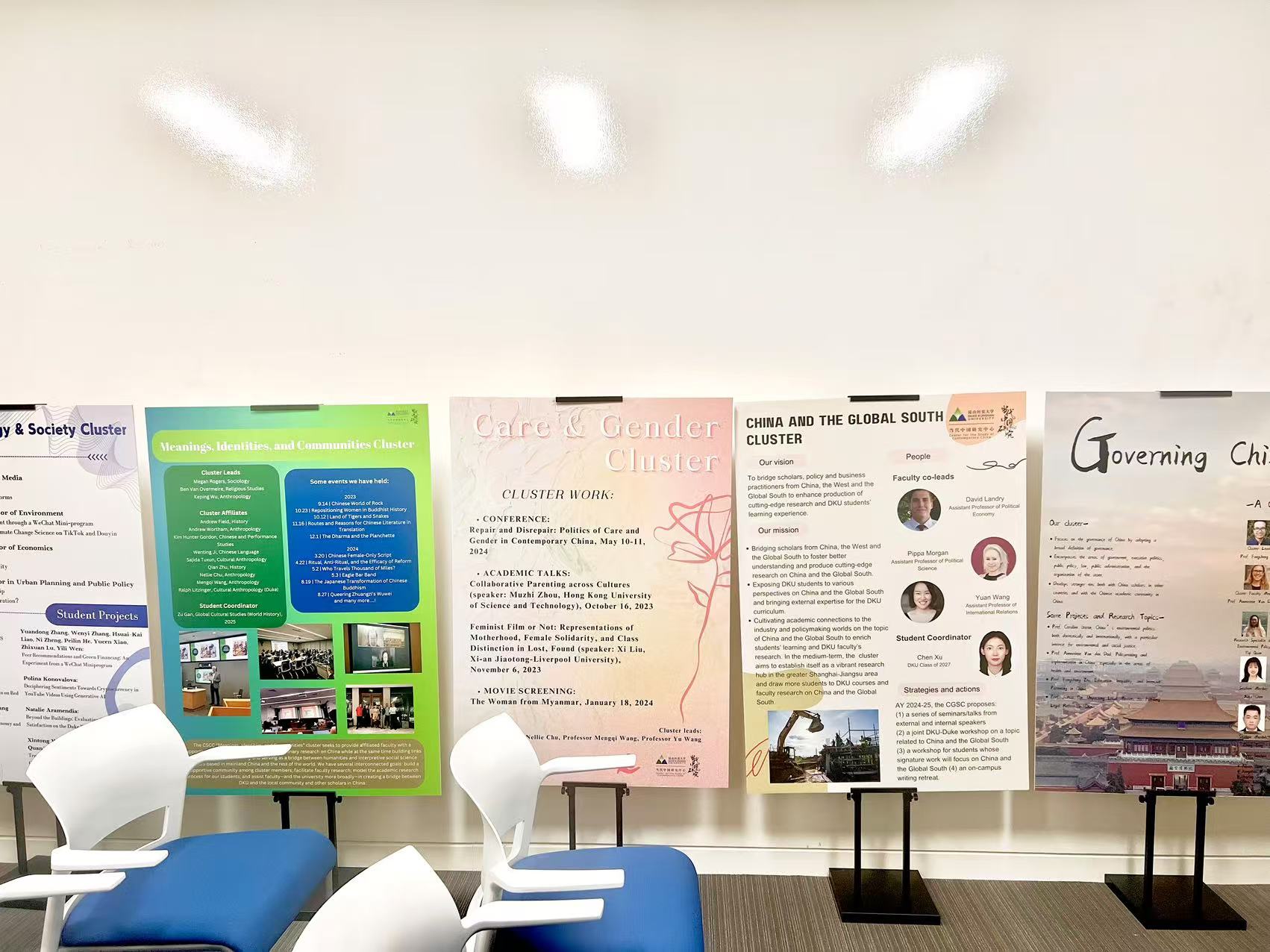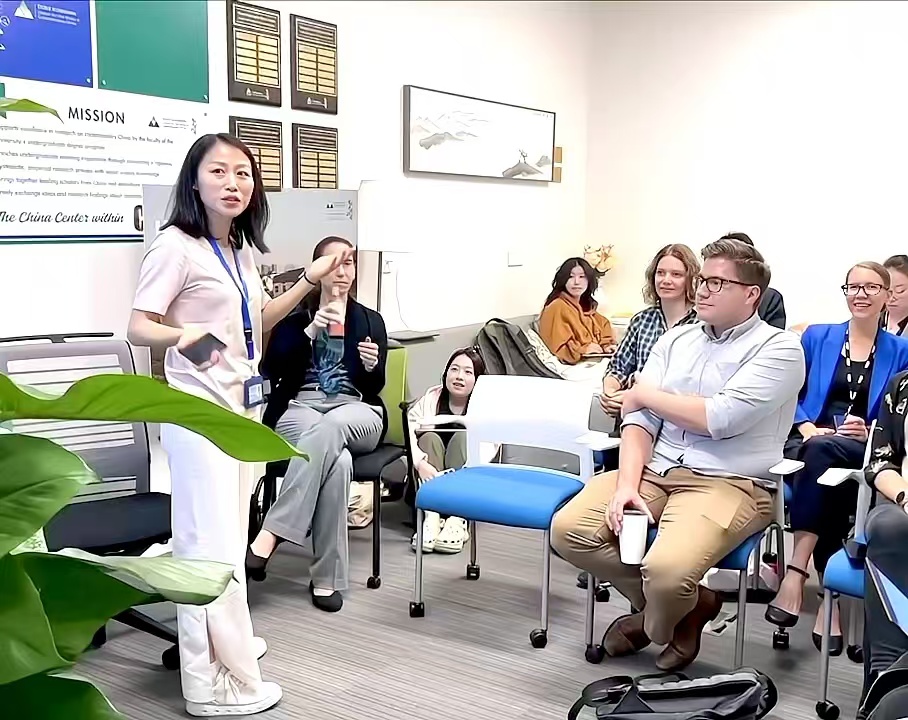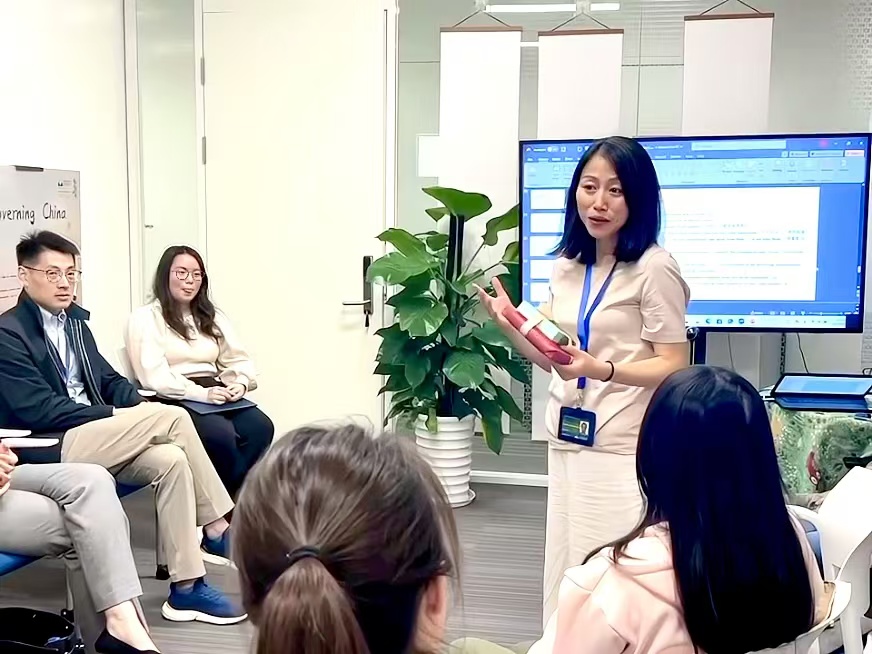By Yue Zhang, Jingxuan Zhuge, Shanshan Wu & Chi Zhang
The Center for the Study of Contemporary China successfully held its first Open House on October 10 in IB3021, its recently revamped community space. The event gathered scholars and students who share research interests in China-related studies. It featured insightful presentations from the center’s six research clusters, engaging discussions themed “The Art of Doing China Research,” and valuable networking opportunities for China-studies groups within DKU.
The day began with an exhibition of cluster posters in IB3021, where attendees had an opportunity to view displays at leisure. This was followed by a series of cluster flash talks and discussions.


Professor Pippa Morgan and Professor David Landry introduced the China and the Global South Cluster. The cluster aims to bridge the academic gap between scholars, policymakers, and business practitioners from China, the West, and the Global South to advance research in this area. They highlighted notable projects from the past academic year, including Yuan Wang and Hong Zhang’s study on China’s role in the development of industrial parks in Africa, and Andrea Ghiselli and Pippa Morgan’s exploration of the Belt and Road Initiative’s influence on democratic institutions. Looking forward, the cluster plans to expand these collaborations and continue to generate meaningful research.
On behalf of the Care and Gender Cluster, Professor Yu Wang introduced the leads’ research interests, which include gender inequality, educational mobility, and family dynamics in China. Her own research covers topics such as educational hypogamy among internal migrants and wealth disparities arising from assortative mating in urban China. This cluster emphasizes interdisciplinary conversations about care, exploring it through various analytical lenses, including labor, gender relations, and public health, and aiming to inspire innovative research directions on social justice, climate change, and governance.
Professor Megan Rogers, leading the Meanings, Identities, and Communities Cluster, shared insights about several of the year’s well-received events, such as the “Chinese World of Rock” book and documentary event and the “Chinese Female-Only Script” workshop. This cluster focuses on cultural identities and transformations within Chinese society, promoting enriching discussions on the shifting meanings of community and identity.
The Governing China Cluster, presented by Professor Fangsheng Zhu along with Professors Jiahua Yue, Annemieke van den Dool, and Coraline Goron, delves into elements of China’s executive politics, policy implementation, and legal framework. This interdisciplinary team examines the interplay between formal and informal structures within China’s complex governance system, with a particular focus on environmental policy and responses to public health crises. Professor Yue, for instance, explores the nuances of China’s international political economy, whereas Professor Van Den Dool studies the impact of crises on legal reforms.
The “The Art of Doing China Research in China” discussion delved into the evolving landscape of China studies, addressing unique perspectives and challenges scholars in this field face, such as cultural misunderstandings, the role of comparative studies, and personal connections to China. The session also considered the impact of the Western gaze on China studies, highlighting the need for more nuanced and diverse representations of China in academic and public discourse. This vibrant exchange of ideas also produced actionable suggestions to elevate the center’s profile, such as increasing visibility through collaborative projects, strengthening ties with local community as well as Chinese universities, and expanding physical spaces dedicated to China studies and the center.


In the afternoon’s cluster flash talks, the China Stories & Images Cluster captivated the audience with presentations from Professors Kaley Clements and Nathan Hauthaler. They shared with the audience a collection of compelling photographs from their fieldwork, collaboration with Prof. Tom Rankin on documentary projects, and previews of upcoming screening events like “Beneath the Rubber Trees“. The cluster is looking to further enhance their collaboration with Duke University for the upcoming academic year.
Following this, Prof. Fan Liang and Prof. Charles Chang from the Digital Technology and Society Cluster provided an overview of their scholarly contributions over the past year. The cluster had a productive period, marked by 10 publications, 14 conference presentations, and supervision of 12 student research projects. They introduced ongoing projects like “AI for Science, Society, and Humanity” and “Digital Platforms”, with a detailed look into a project titled “The ‘Invisible’ Female Riders in Food Delivery: Exploring the Impact of Platform Algorithms on Female Workers in the Gig Economy,” which included an excellent presentation by student researcher Yixin Gu.
The Open House concluded with a relaxed networking chat, providing an opportunity for personal and professional connections to be strengthened. This informal gathering also marked the transition of the center’s co-directors, bidding farewell to Baozhen Luo-Hermanson and warmly welcoming Annemieke van den Dool. Representing the CSCC community, the incoming co-director Dr. van den Dool, presented a community-signed card, a beautifully custom-made CSCC bookmark, and a book as a farewell gift to Dr. Luo-Hermanson.


Events like this are significant for the CSCC, underscoring its role as more than just an academic platform, but also as a communal space where scholars and students can convene. The Open House has affirmed the CSCC’s role as “the China Center within China”, not only for its scholarly contributions but also for promoting a collaborative spirit among its members. The CSCC thereby fosters an environment where community members can explore complex China-related issues together, sharing knowledge and developing innovative research approaches in a collegial atmosphere.


